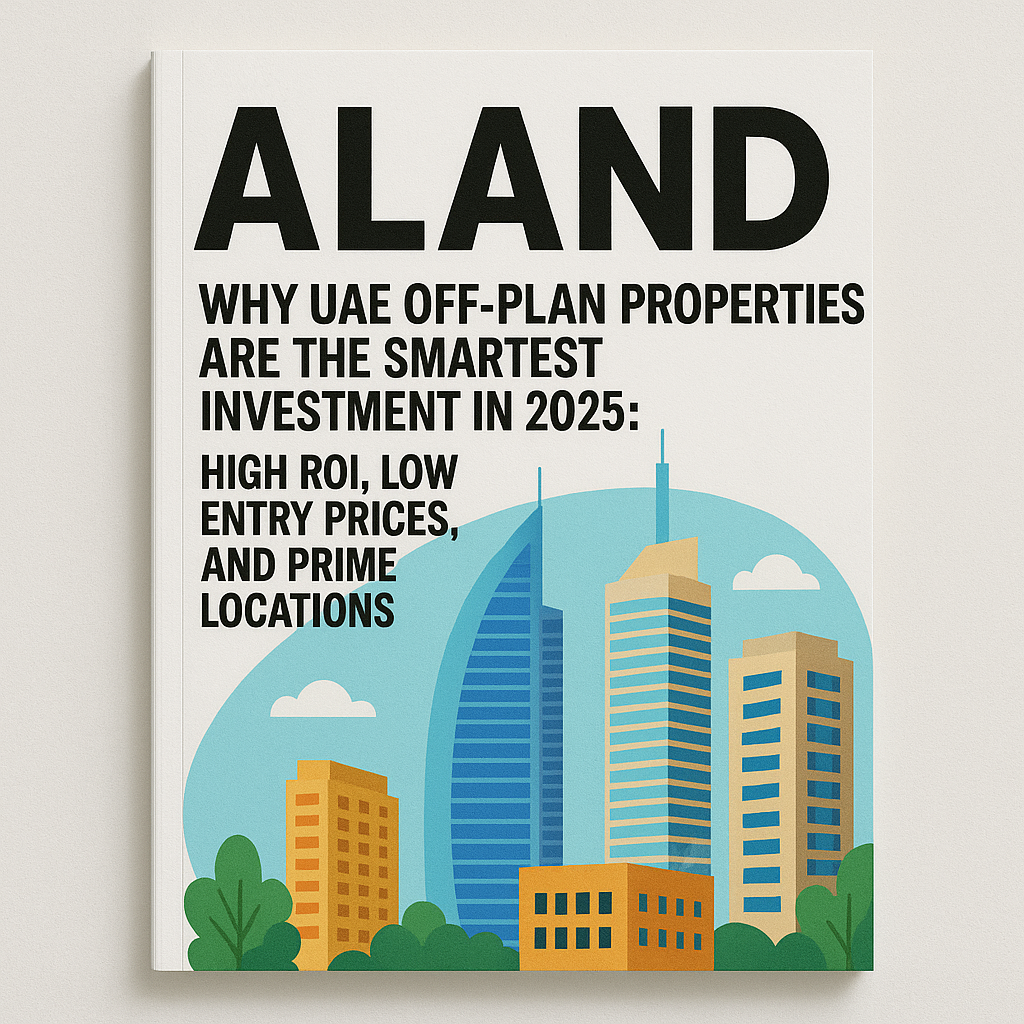Why UAE Off-Plan Properties Are the Smartest Investment in 2025: High ROI, Low Entry Prices, and Prime Locations
- Published Date: 1 May, 2025
-
165★ ★ ★ ★ ★(5)

A New Era of Strategic Real Estate Investment
Real estate has always been one of the most reliable pathways to wealth creation, but in 2025, few markets offer the dynamic potential seen in the United Arab Emirates. Among the various asset classes within the UAE property market, off-plan developments—properties bought before construction completion—stand out for their ability to offer high returns on investment (ROI), low initial capital requirements, and access to prime urban locations.
At first glance, these advantages might appear promotional, but as an economist who has studied market cycles across continents and asset classes, I see off-plan real estate in the UAE as a powerful intersection of macroeconomic positioning, global capital flows, and government-backed infrastructure development.
This article is not just a commentary—it’s a comprehensive roadmap for investors who want to make informed, strategic decisions based on logic, opportunity, and a future-focused lens.
What Are Off-Plan Properties—And Why Do They Matter Now?
Off-plan investments allow buyers to purchase a property at the planning or construction stage, often at a significant discount compared to the market value once the project is completed. These investments are not just about acquiring real estate—they are about timing, vision, and economic foresight.
Developers frequently offer flexible payment structures, including post-handover options, and the buyer can lock in a property in a high-potential location while paying in phased installments. The appeal is particularly strong in 2025 as developers, backed by supportive government policies, accelerate large-scale projects that will reshape the future of UAE cities.
1. High ROI: The True Catalyst Behind Investor Demand
Return on investment in the off-plan space can be segmented into two stages:
- Pre-completion appreciation: Properties bought at launch often appreciate 10–25% before handover, especially in areas like Downtown Dubai or Palm Jumeirah.
- Post-completion rental yields: UAE’s tax-free income environment allows for net yields ranging from 6% to 10%, outperforming many Western markets weighed down by taxation and low rental demand.
At ALand, we’ve seen a pattern: the earlier the purchase in a high-velocity market, the higher the margin before delivery. With smart planning, investors can even flip their contracts mid-construction at a profit, a tactic many high-net-worth individuals employ for fast liquidity and leverage.
2. Low Entry Prices: Democratizing Real Estate Access
With starting prices as low as AED 280,000, investors can enter premium zones of Dubai or emerging emirates like Sharjah and Ajman. This low capital requirement compared to ready-built properties is a critical entry point for global investors—especially from regions where capital restrictions or currency volatility limit traditional investment channels.
Example Projects:
- Nest Student Residences – Aljada, Sharjah (from AED 280,000)
- Al Ameera Village – Ajman (from AED 350,000)
- Nautica – Dubai Maritime City (from AED 1.33 million)
These units are listed on ALand’s Off-Plan Section, where investors can explore opportunities curated for both affordability and future appreciation.
3. Prime Locations: Investing in Tomorrow’s Landmarks
Location is no longer just a matter of luxury—it’s a forecast of infrastructure, lifestyle demand, and global capital flow. The following districts are driving the off-plan boom:
- Downtown Dubai – Still the heart of the city. Projects like Franck Muller Aeternitas offer design excellence and high-end appreciation potential.
- Dubai Maritime City – A new-age urban zone built for marine commerce and residential prestige.
- Palm Jumeirah – An island known globally for exclusivity. Projects like Como Residences are redefining beachfront living for ultra-high-net-worth clients.
These are not static neighborhoods—they are dynamic investment narratives in motion, backed by the Dubai 2040 Urban Master Plan, Expo 2020 legacy, and continued foreign investor interest.
4. Policy Support and Global Stability
The UAE has created one of the world’s most pro-investor real estate environments:
- Golden Visa programs for property investors
- 100% foreign ownership in designated freehold zones
- Tax-free rental income
- Stable currency pegged to the US dollar
In a world increasingly vulnerable to inflation, political instability, and banking volatility, the UAE has become a safe harbor for capital. Investors from Russia, China, Europe, and Africa continue to pour into the market, not just for returns—but for economic citizenship.
5. The ALand Advantage: Technology-Driven, Expert-Curated
As the founder of ALand, I have worked to ensure that our platform is more than just a listing site—it’s a strategic partner for global investors. Through AI-backed data insights, verified developer records, and live price tracking, ALand empowers users to evaluate off-plan opportunities with clarity and precision.
Explore the most up-to-date off-plan offerings in the UAE here:
Top Featured Listings:
- Franck Muller Aeternitas – Downtown Dubai
- Nautica – Dubai Maritime City
- Como Residences – Palm Jumeirah
- Nest Student Residences – Sharjah
- Al Ameera Village – Ajman
About the Author
Dr. Pooyan Ghamari is a Swiss Economist, Real Estate Strategist, and Founder of the ALand Platform. With a background in global macroeconomics, investment modeling, and financial innovation, he advises institutions and governments on wealth strategy, digital finance, and sustainable development.
Through ALand, he’s pioneering a transparent, AI-powered ecosystem for property investment that aligns with long-term economic shifts and investor needs. Dr. Ghamari continues to explore the intersection of decentralization, migration trends, and smart urbanism—shaping the future of real estate and human mobility worldwide.

